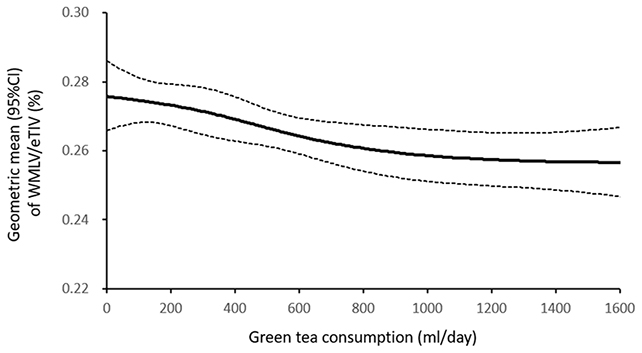
A new study links drinking green tea with having fewer white matter lesions in the brains of Japanese seniors, potentially providing a level of protection against dementia.
Researchers from institutions across Japan teamed up to analyse data on 8,766 volunteers over the age of 65, collected as part of a survey conducted between 2016 and 2018.
Self-reported green tea and coffee consumption was cross-referenced against magnetic resonance imaging ( MRI) brain scans, which measured overall brain volume and features of five different brain regions.
While these stats don't show direct cause and effect – the study just looked at one snapshot in time – adjustments were made for factors including age, sex, exercise, and education level, suggesting a solid link between the amount of green tea consumed and the relative volume of damaging lesions across the brain.

"This cross-sectional study found a significant association between lower cerebral white matter lesions and higher green tea consumption, but not coffee consumption, in older adults without dementia, even after adjusting for confounding factors," write the researchers in their published paper.
Averaged out, those who had three cups of green tea per day had 3 percent fewer white matter lesions compared with those drinking one cup per day. Those who drank seven to eight cups per day had 6 percent fewer lesions, compared to those drinking one cup a day.
As far as statistical patterns go, the difference is significant. However, green tea consumption didn't seem to affect hippocampal volume or total brain volume, which can also indicate cognitive decline.
It's important to note as well that green tea consumption didn't seem to make a difference in people diagnosed with depression, or with the APOE4 gene variant linked to Alzheimer's disease.
Given previous investigations linking green tea with lower blood pressure, and other studies associating lower blood pressure with a reduced risk of dementia, at least one mechanism responsible for the results could be cardiovascular.
"Moreover, green tea contains less caffeine than coffee, which negatively affects blood pressure, thus suggesting that green tea may have a more beneficial impact on white matter lesions," write the researchers.
We've previously seen green tea associated with managing weight levels and killing cancer cells, and it seems we're not done yet in discovering the potential benefits of this drink – which we know has antioxidant ingredients such as catechins in it.
The researchers aren't stopping here: all of the participants in the current study were Japanese, which means certain patterns in genetics and lifestyles. Future studies could open up the analysis to a broader group of people.
"Our findings indicate that drinking green tea, especially three or more glasses per day, may help prevent dementia," write the researchers. "Nevertheless, further prospective longitudinal studies and basic research are needed to validate our results."
The research has been published in npj Science of Food.